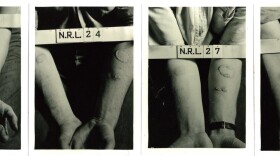
Caitlin Dickerson
Caitlin Dickerson is an NPR News Investigative Reporter. She tackles long-term reporting projects that reveal hidden truths about the world, and contributes to breaking news coverage on NPR's flagship programs. Her work has been honored with some of the highest awards in broadcast journalism, including a George Foster Peabody Award and an Edward R. Murrow Award. In 2015, Dickerson was also a finalist for the Livingston Award.
In 2015, her investigation into Secret World War II Mustard Gas Experiments uncovered new details about chemical weapons testing the U.S. government conducted on minority soldiers to look for racial differences that could be exploited in battle. The investigation showed that for decades, the Department of Veterans Affairs had been systematically denying compensation to test subjects who sustained injuries. The series of reports led U.S. government officials to admit, for the first time, to the race-based testing program, and resulted in the introduction of legislation that would make it easier for test subjects to secure VA compensation.
Dickerson has contributed reporting to NPR's coverage of major domestic and international news stories, including the deadliest mass shooting in modern U.S. history, in Orlando, Florida in 2016. In 2014, she reported from the U.S. on the West African Ebola outbreak, with stories about military efforts to prevent the spread of the virus on American soil, and the ethics of a push by American scientists to deploy an experimental vaccine in West Africa. She also contributed to NPR's New Boom series that explored the Millennial generation's impact on America.
Dickerson came to NPR in 2011 after graduating Magna Cum Laude from California State University, Long Beach, where she earned a bachelor's degree in International Studies and was inducted into the Phi Beta Kappa Society. Before joining NPR's Investigations Team, she worked as a producer and editor on Morning Edition and Weekend Edition. Among her more memorable contributions are a series on addiction and a deep look at diversity in the television industry, which won a National Association of Black Journalists Salute to Excellence Award in 2014.
-
After conviction, noncitizens face deportation in a second system of justice that has different rules and fewer protections. NPR followed one man — and his family — through the process.
-
The World War II military experiments exposed more than 60,000 American troops. But because the testing was classified, many family members of veterans never learned the details of what happened.
-
The U.S. military exposed tens of thousands of troops to chemical and biological agents before 1975. Today, those vets are seeking health care and details on what substances they were given.
-
When the Pentagon revealed it secretly exposed enlisted men to mustard gas during WWII, VA officials promised disability benefits. But an NPR investigation finds that most were never contacted.
-
While the Pentagon acknowledged years ago that it used American servicemen in World War II mustard gas experiments, NPR found new details about tests that grouped subjects by the color of their skin.
-
The CDC and Pentagon are both training "go-teams" that can be on the ground within days of an Ebola diagnosis in the U.S. Team members learn about containing infection and dealing with the stress, but it's unclear how these crews will work with each other.
-
Traditional methods for containing the Ebola outbreak aren't working fast enough. So some scientists want to bypass the typical trial phases and bring new vaccines directly to people at risk.
-
For their popular podcast, two longtime friends sit down at a kitchen table and share little-known anecdotes and historical facts about New York. Its bare-bones production hasn't hurt its popularity — it's been downloaded 5 million times in the past five years.







